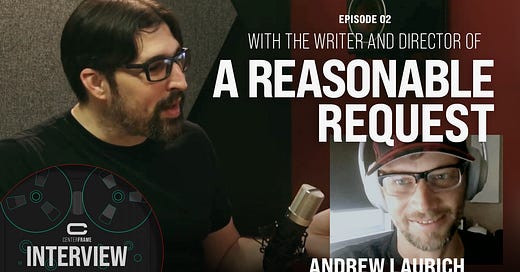In this episode, Andrew Laurich—co-writer and director of the acclaimed short film A Reasonable Request—joins host
to discuss how the short’s outrageous premise was grounded in realistic performances. Andrew shares how the film’s success on the front page of Reddit led to a Sundance premiere, and offers insight into navigating festivals, balancing comedic absurdity with emotional authenticity, and choosing minimalist cinematic techniques for maximum impact. He also talks about his storytelling influences, collaborating with co-writers for cultural accuracy, and developing upcoming feature projects. Throughout, Andrew provides practical advice on festival strategy, distribution, and the creative process.Episode breakdown:
1. (00:01 – 00:54) Introduction and CenterFrame Overview
Host Bernard Pucher introduces CenterFrame Interviews and today’s guest, writer-director Andrew Laurich.
Explains that CenterFrame is a filmmakers’ club focusing on networking, funding, and showcasing films.
2. (00:54 – 02:08) Discovering “A Reasonable Request”
Bernard recounts first seeing Andrew’s short film A Reasonable Request (2015).
Andrew describes how the film’s absurd premise came from a friend’s idea and eventually made the front page of Reddit for six hours, leading to a Sundance selection.
3. (02:08 – 05:39) Grounding Absurdity and Audience Reactions
Andrew highlights how grounded characters make the film’s over-the-top premise feel believable.
Discusses the balance between comedic absurdity and emotional authenticity: viewers end up rooting for the father and son despite the taboo nature of the request.
4. (05:39 – 11:57) Cinematic Influences and Stylistic Choices
Andrew cites David Fincher and other directors known for precise, minimalist camerawork.
Emphasizes that limiting camera movement and simplifying the lighting helped highlight performances and keep the focus on the dialogue.
5. (11:57 – 19:17) Navigating the Festival Circuit
Andrew details his festival submission strategy and how premier requirements have relaxed for shorts.
Explains Sundance’s rigorous multi-tier selection process and how smaller festivals often discover films through bigger festival lineups.
Touches on the high costs of festival submissions and hidden travel expenses.
6. (19:17 – 29:04) Advice on Targeting Festivals and Distribution
Andrew underscores the importance of researching festivals (location, audience interests, and programming themes).
Mentions smaller, well-funded festivals (e.g., Breckenridge) that may offer better filmmaker support than bigger names.
Suggests being strategic with distribution— exposure vs. exclusivity.
7. (29:04 – 37:34) Early Filmmaking Influences and Storytelling Approach
Andrew recalls the thrill of early editing experiments as a student.
Cites 1990s films like A Simple Plan as key inspirations.
Notes an affinity for dialogue-driven scenes (e.g., My Dinner with Andre) and how comedic elements should come from character authenticity rather than forced gags.
8. (37:34 – end) Directing Style, Collaboration, and Upcoming Projects
Discusses performance direction and how comedy should feel natural; references Taika Waititi’s organic on-set approach.
Highlights the collaborative writing process, co-writing a feature with an Indian writer to ensure authentic cultural representation.
Mentions a few spec scripts in development, including a father-son story akin to The Squid and the Whale meets The Descent, plus a potential project in New Zealand.




Share this post